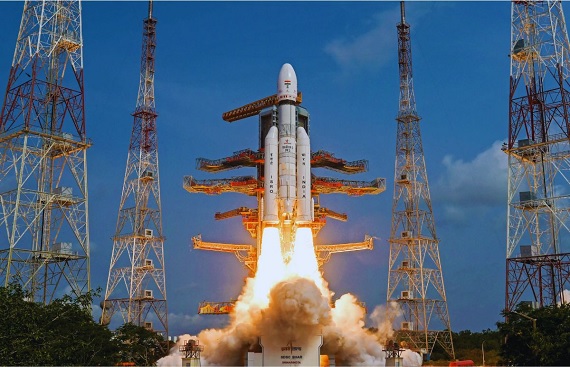ISRO's 100th Mission from Sriharikota Takes Off Successfully
By
siliconindia | Thursday, 30 January 2025, 09:09:08 AM IST

The Indian Space Research Organisation has achieved a historical milestone by its 100th launch from the Satish Dhawan Space Centre. At 6:23 AM, the GSLV-F15 rocket carrying the NVS-02 satellite flew into the sky, which again proved that India is increasing in space capabilities and ambitious future plans.
ISRO Chairman V. Narayanan, who joined office on January 16, hailed the launch as a big achievement. This mission is the 100th launch from our launchpads, which is a very significant milestone for India," he said. The successful launch is also the eighth operational flight of India's Geosynchronous Satellite Launch Vehicle with an indigenous cryogenic stage. The NVS-02 satellite, part of the NavIC constellation, will play a crucial role in terrestrial, aerial, and maritime navigation, as well as precision agriculture.
Prime Minister Narendra Modi congratulated ISRO on this remarkable achievement. "Congratulations to @isro for this historic 100th launch! This incredible milestone illustrates the vision, dedication and commitment of our scientists and engineers. With the private sector joining hands, India's space journey will continue to achieve newer heights", he posted on X (formerly Twitter). Union Minister of State for Space, Dr. Jitendra Singh, also informed that the space sector was booming rapidly as there were plans for a third launch pad at Sriharikota and a new spaceport at Tuticorin in Tamil Nadu's district. The prime minister laid its foundation stone last February.
The atmosphere at the spaceport remained characteristically humble despite the landmark achievement. ISRO scientists exchanged smiles, handshakes, and pats on the back before heading to their scheduled meetings true to the organization's understated culture that has persisted for over five decades. From the early days of carrying Rohini series (RH-75, RH-100) sounding rockets on their shoulders or bicycles in Thumba, Kerala, to the present, ISRO has maintained an ethos of quiet determination and excellence.
Gopalan Madhavan Nair, former ISRO Chairman, emphasized the organization's unique work culture. "ISRO designs, develops, and manufactures its rockets under a common roof, much like Elon Musk's SpaceX but ISRO did it first", he said. He credited the agency's success to its open work environment, which encourages scientists and engineers to voice their technological insights while also involving academia in critical reviews.
Dr. Krishnaswamy Kasturirangan, another former chairman, said that ISRO's track record in launch vehicle technology shows India is ready for major international collaborations. "We have learned from small failures in the early days to develop advanced rockets and satellites. The reliability of our launch vehicles is now among the best in the world", he said. Recalling a defining moment in ISRO's history, he related how he was brought to tears in 1994 while observing the first successful flight of the Polar Satellite Launch Vehicle. Today, PSLV is still ISRO's workhorse, delivering satellites with remarkable precision.
India's space industry is estimated at around $8 billion, currently accounting for 2-3% of the global space economy. The government projects the figure to reach $100 billion by 2040. The Department of Space's budget for 2024-25 amounts to ?13,042.75 crores and has been incremented by ?498.84 crores from the past fiscal year. So far, ISRO has successfully placed 548 satellites in orbit weighing a total of 120 tonnes with 433 being for international clients.
According to Dr. Mylswamy Annadurai, former Director of the U R Rao Space Centre in Bengaluru, the number will be "skewed upwards". He said ISRO's third launch pad at Sriharikota, a new spaceport coming up at Kulasai, near Thoothukudi, Tamil Nadu and infrastructural capacity being developed by the private space startups would inject a sharp upward curve to the frequency of launches. The new launch site, spread over 2,300 acres with a budget of ?986 crore, is expected to be operational by 2028.
The Indian private space sector also is moving ahead in bold steps with innovation by startups focusing in private space stations, lightweight but robust rockets, advanced satellite propulsion, and even space debris cleanup. This multipronged approach indicates that Indian scientists are not satisfied with the earlier achievements.
ISRO has already made the list of accomplishments around the globe. The space agency has bagged the title of having the world's largest constellation of remote sensing satellites. ISRO also became the first country to orbit Mars on its very first try. The fourth country to have successfully landed softly on the Moon is India with Chandrayaan-3-a feat accomplished within a relatively small budget.
Looking forward, technological challenges will remain the greatest obstacle for ISRO. The much-awaited Gaganyaan mission, where India will send its astronauts to space aboard an indigenously made launch vehicle, is scheduled for the next two years. ISRO plans to set up its first indigenous space station, called the 'Bharatiya Antariksha Station', by 2035, with manned lunar landing predicted during the following decade. However, these missions will have to go through a wrestle against China's rapidly advancing space program. China already has a fully operational space station, launched a human into space nearly two decades ago, and has executed a successful lunar soil-return mission. ISRO is looking to achieve similar milestones with upcoming missions like Chandrayaan-4.
Dr. Vasudevan Gnana Gandhi, a veteran from the early Thumba days, is upbeat regarding the prospects of ISRO. He believes that the ingenuity of ISRO will find its place in the global space race. He praised the leadership of Chairman Dr. V. Narayanan, saying it had much experience in rocket technology, which would inspire and guide the next generation of Indian scientists and engineers.
With every successful launch, ISRO is pushing out the boundaries further to make new possibilities a reality and reinforce that status of the mighty space powers in India. While the agencies prepare for upcoming missions, all is clear ISRO is no longer launching some satellites; instead, it will launch India for its future adventures into space.
Read More News :
How Multicap Funds Work: A Complete Overview
Unlock Your Potential: Top Diploma Courses to Pursue in 2025



